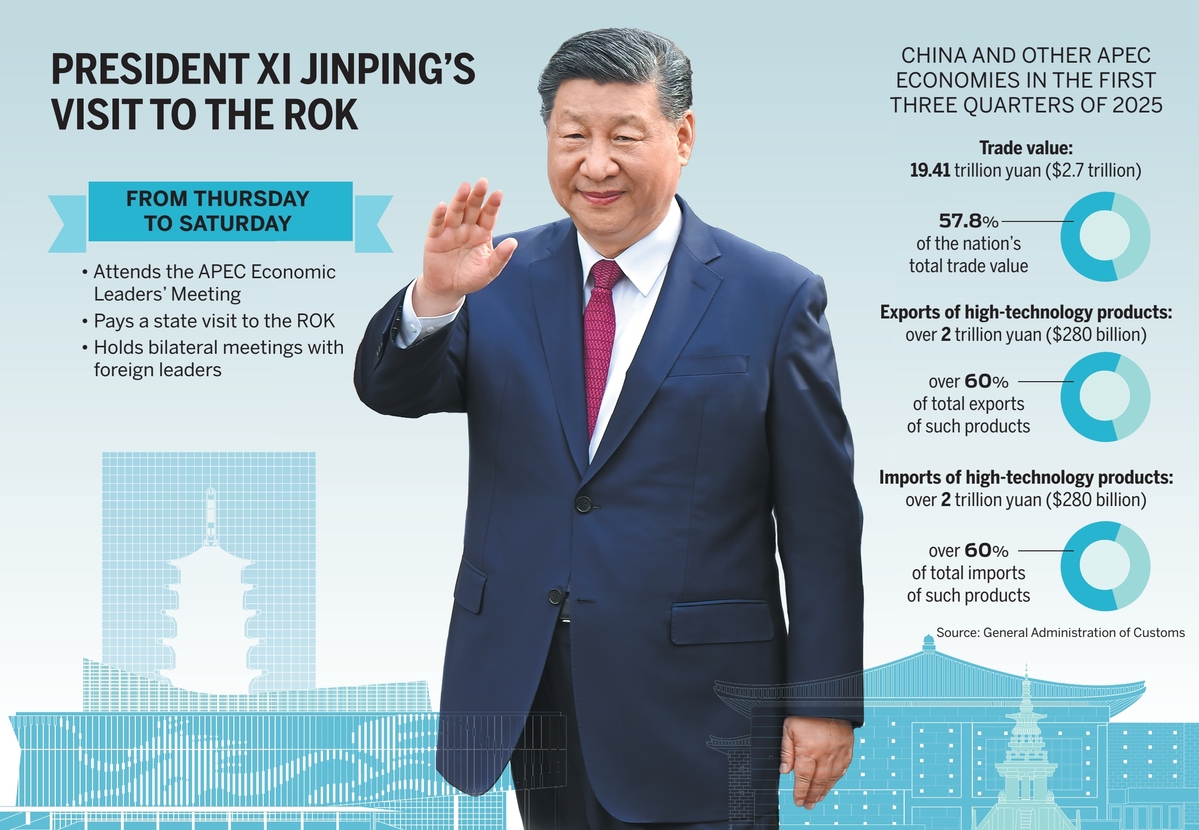Observers say APEC can help region to boost dialogue, cooperation amid global challenges

As President Xi Jinping visits the Republic of Korea and attends the 32nd APEC Economic Leaders’ Meeting, observers said the international community is paying close attention to signals of dialogue and cooperation amid mounting challenges to multilateralism and sluggish global economic growth.
China continues working with all parties to discuss plans for regional prosperity and development, foster consensus on unity and cooperation, address global challenges, and jointly chart a new chapter for Asia-Pacific development, they said.
During the three-day trip, which began on Oct 30, Xi will deliver remarks at the APEC Economic Leaders’ Meeting and hold bilateral talks with leaders of relevant economies. He will also pay a state visit to the ROK.
As the Chinese president, Xi has attended every APEC Economic Leaders’ Meeting since 2013, showing China’s support and the active and constructive role the country plays in the region’s highest-level, most extensive, and most influential economic cooperation mechanism.
Cui Fan, a professor of international trade at the University of International Business and Economics in Beijing, said that at each of these meetings, the Chinese president has underscored the importance of advancing regional economic integration.
“It is expected that Xi will once again call for continued efforts in this regard in his remarks this year,” Cui said, adding that this will reaffirm China’s steadfast commitment to multilateralism at a time when economic globalization faces headwinds and protectionism is on the rise.
The Asia-Pacific region, which is home to one-third of the world’s population, now accounts for more than 60 percent of the global economy and nearly half of world trade. It is the world’s most dynamic growth engine and a prime example of regional economic integration.
Liu Chenyang, director of the APEC Study Center at Nankai University in Tianjin, said holding the APEC meeting against the backdrop of growing uncertainty demonstrates the mechanism’s vital role in bridging differences and maintaining dialogue across the Asia-Pacific region.
He said that the consensus to be reached among the leaders, if any, on issues such as trade and investment liberalization, innovation, the digital economy, and inclusive and sustainable growth, will reflect the shared commitment of member economies to maintaining the regional economic order and promoting common prosperity.
“Since its establishment more than 30 years ago, APEC has effectively responded to challenges such as the financial crisis and the COVID-19 pandemic, and has played an important role in strengthening the cohesion of Asia-Pacific cooperation,” Liu said.
“Compared with the past, Asia-Pacific cooperation faces greater challenges this year,” he added. “What the international community is watching now is whether APEC can continue to put economic and trade cooperation at the forefront and build consensus despite differences.”
Carlos Kuriyama, director of the Policy Support Unit at the APEC Secretariat, said in a news release that trade growth this year across the Asia-Pacific is expected to moderate after last year’s strong performance.
“Sustaining momentum will depend on reducing policy uncertainty by sending clear signals to the business community, including those in digital and AI-enabled sectors,” he said, noting that the current APEC meeting offers a critical opportunity to deepen cooperation and promote more inclusive and resilient growth.
Observers noted that small and medium-sized enterprises, which account for 97 percent of all businesses in APEC economies, are more likely to be affected by challenges such as protectionism and unilateralism.
China is currently the major trading partner of many Asia-Pacific economies and a key player in regional industrial and supply chains.
In the first three quarters of this year, China’s trade with other APEC economies increased 2 percent year-on-year, reaching 19.41 trillion yuan ($2.7 trillion) and accounting for 57.8 percent of the nation’s total trade value.
Muhammad Habib, a researcher at the Department of International Relations at the Centre for Strategic and International Studies in Indonesia, said APEC plays an important role in maintaining trust across the Pacific region.
With rising protectionism and fragmentation, Habib said that economies must constructively address trade-related concerns, whether these involve unfair practices, imbalances, overcapacity, or tariffs.
“Openness and confidence require all sides to continue engaging in dialogue and taking steps for the greater good,” he said. “The principles and platforms of multilateralism must be upheld throughout this process.”
China has continuously injected its strength into building an open Asia-Pacific economy in recent years.
Wirun Phichaiwongphakdee, director of the Thailand-China Research Center of the Belt and Road Initiative, said that China-proposed initiatives have become the most influential intellectual engines within APEC, providing theoretical guidance for the stable development of the entire Asia-Pacific region and charting the course for building a peaceful and prosperous region.
Contact the writers at mojingxi@chinadaily.com.cn


